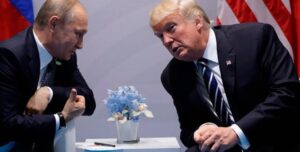
U.S. President Donald Trump said on Saturday he does not plan to meet with Russian President Vladimir Putin until he thinks a deal is in place to secure peace between Russia and Ukraine.
“You have to know that we’re going to make a deal, I’m not going to be wasting my time,” Trump told reporters in Doha.
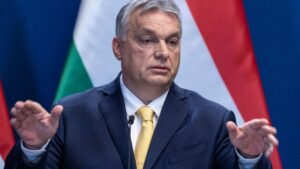
Hungarian Prime Minister Viktor Orbán has said he is ready to host a meeting between US President Donald Trump and Vladimir Putin in Budapest, Hungary.
“The planned meeting between the US and Russian presidents is great news for peace-loving people around the world. We are ready!” Orbán wrote on social media on Thursday.
As reported, Trump spoke with Vladimir Putin on Thursday, calling it a very productive conversation, and announced the planned meetings—a personal meeting in Budapest and a meeting between advisers beforehand. He also said that during a planned meeting on Friday with Ukrainian President Volodymyr Zelensky in the Oval Office, the parties will discuss this conversation with Putin “and much more.”
At the same time, Trump said that during the conversation with Putin, he devoted a lot of time to discussing “trade between Russia and the US after the end of the war with Ukraine.”
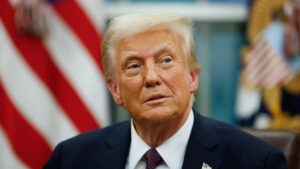
US President Donald Trump says he is closely monitoring the actions of Vladimir Putin and Ukrainian President Volodymyr Zelensky and intends to put an end to the killings in the Russian-Ukrainian war.
During a press conference in Washington on Tuesday, when asked by a reporter if there would be any consequences for Putin and Zelensky if they did not meet, the US president replied: “We’ll see what happens, we’ll see what they do. I am watching this very closely.“ ”Last week, they lost 7,317 soldiers for no reason. Both Russians and Ukrainians. I want to put an end to this,” Trump added.
As reported, on August 30, Trump confirmed the holding of trilateral negotiations on the war with Zelensky and Putin and acknowledged that the parties are not yet ready for bilateral negotiations.
On September 2, Trump said he was extremely disappointed with Vladimir Putin in the context of the Russian-Ukrainian war, despite his excellent relationship with him, and announced an aid package without specifying its size and content, emphasizing that this was not “a matter for Ukraine.”
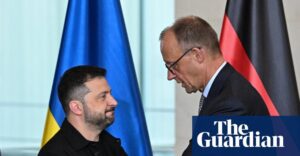
US president also suggests he would push for second summit if his meeting with Putin goes well alongside Vlodymyr Zelenskyy
Vladimir Putin will face “very severe consequences” if he does not agree a ceasefire in the war in Ukraine at his summit with Donald Trump in Alaska, the US president said on Wednesday.
Speaking after a call with Vlodymyr Zelesnkyy and other European leaders, including Britain’s Keir Starmer, Trump also suggested he would push for a second summit if his meeting with Putin goes well – this time including his Ukrainian counterpart.
“If the first one goes okay, we’ll have a quick second one,” Trump told reporters in Washington. “I would like to do it almost immediately, and we’ll have a quick second meeting between President Putin and President Zelenskiy and myself, if they’d like to have me there.”
Trump did not provide a timeframe for a second meeting. He is to meet Putin in Anchorage, Alaska, on Friday.
Asked if Russia would face consequences if Putin did not agree to stop the war after the Alaska meeting, Trump said: “Yes, they will … very severe consequences.”
The president’s remarks came after he had what he described as a very good call with European leaders in which he consulted about the goal and strategy for his summit. He pleased Europe’s leadership by giving reassurances that a ceasefire was his priority and he would not make any territorial concessions without Kyiv’s full involvement.
Trump’s approach at the video conference, as described by France’s Emmanuel Macron, appeared to reassure some of the leaders, who were making a final collective plea to the unpredictable US president that he had a duty to protect Ukraine’s sovereignty – and European security – at the talks in Alaska.
The European leaders spoke with Trump and his vice-president, JD Vance, in a hastily convened one-hour meeting in an effort to shape Trump’s negotiating strategy. Zelenskyy and European leaders have been excluded from the Alaska summit and fear that Trump, intent on fulfilling his election campaign guarantee that he could easily end the bloodshed in Ukraine, will make concessions that compromise Ukraine’s future sovereignty.
But Trump underlined his promise that the summit was not in itself a substantive negotiation but what he described as a “feel-out” to test Putin’s terms to sign a temporary ceasefire that would then lead to talks with the Ukrainians. Trump said it had been a very good call, adding he rated it at a 10 out of 10.
The European intervention involved a group of European leaders and Zelenskyy discussing the US negotiating strategy with Trump and Vance.
Afterwards the German chancellor, Friedrich Merz, stressed that Europe wanted Trump to be successful in Alaska but that it had made clear to the US president that Ukrainian and European interests had to be protected at the summit.
Merz speaking with Zelenskyy by his side at a press conference in Berlin said the right chronology was a 30-day ceasefire, and then substantive talks. Putin has resisted a ceasefire for months.
Setting out the key principles on which Europe is united he said: “The principle that borders cannot be changed by force must continue to apply.
“Negotiations must include robust security guarantees for Kyiv. The Ukrainian armed forces must be able and remain able to effectively defend the sovereignty of their country. They must also be able to count on western aid in the long term.
“Negotiations must be part of a common transatlantic strategy. Then they can ultimately be most likely to succeed. This strategy must continue to rely on strong support for Ukraine and necessary pressure against Russia. This also means, if there is no movement on the Russian side in Alaska, then the United States and we Europeans should … increase the pressure.”
He added there cannot be any Russian legal ownership of Ukrainian territory.
“President Trump knows this position, he shares it very extensively and therefore I can say: We have had a really exceptionally constructive and good conversation with each other.”
Macron said no serious discussions had taken place about Russian-Ukrainian land swaps involving the ceding of Ukrainian territory, and Trump had anyway underlined that any such discussions could only be negotiated with Kyiv. He said Trump would fight for a trilateral meeting between Ukraine, the US and Russia and that such a meeting would be held in Europe.
The Nato secretary general, Mark Rutte, said the ball was now in Russia’s court on whether it wanted a ceasefire, and he said the transatlantic alliance was united.
One European diplomat said: “Overall the meeting was reassuring in that our points came across, but the question remains whether Trump will stick to the agreed script when he gets into the room with Putin.”
Trump met heads of state and government leaders from Germany, the UK, France, Italy, Poland and Finland, as well as the European Commission president, Ursula von der Leyen. Later, the European leaders were due to report back to the so-called coalition of the willing, the group of western countries that have in principle signed up to provide practical military guarantees to protect Ukrainian sovereignty in the event of a peace settlement. The guarantees issue was raised in the call with Trump, but no breakthrough was made in the US offering to provide practical support to the coalition.
But the Europeans’ main objective had been to seek reassurances from the notoriously fickle Trump that he would not be lured into making irretrievable pledges requiring Ukraine to make concessions of land as the price for securing Putin’s agreement to a ceasefire. They also tried to extract bankable guarantees that Trump was still prepared to deploy as yet unused economic levers that could damage Russian revenues and play into Putin’s assessment of his bargaining strength.
With news of significant Russian military advances emerging from the battlefield, Zelenskyy travelled to Berlin to be at the side of Merz during the meeting – both a show of solidarity and a means of reducing the risk of a row between Zelenskyy and Trump.
European leaders have been careful in public to welcome Trump’s summit but in private fear Trump is bent on improving US-Russia relations and sees a loss of Ukrainian sovereignty as a necessary and unavoidable price to secure that objective.
In advance of the meeting, Trump complimented the European leaders as “great people who wanted to get a deal done”, but he has been vague about his strategy, including the terms he will offer to induce Putin to agree to a ceasefire, which is Ukraine’s precondition for talks. Vance, better briefed than his president, thinks Europe has to show greater leadership by admitting that painful concessions are necessary to end a war Ukraine does not have the troops to win.
Zelenskyy revealed that the overall personnel ratio between Ukraine and Russia stood at one to three in favour of Russia, while in artillery the ratio is one to 2.4.
The issues at play are territorial concessions, military guarantees to ensure Russia does not restart the fighting, and Ukraine’s future relationship with western institutions including Nato.
Zelenskyy has vowed that the Ukrainian military will not voluntarily surrender territory in Donetsk and Luhansk, but Russia is insisting at least four Ukrainian regions will become Russian either at the negotiating table or through force.
Trump vented his fury at media reporting of his meeting with Putin, writing on Truth Social: “The media is being really, really unfair about my meeting with Putin. They keep quoting fired losers and really stupid people like John Bolton, who just said that even though the meeting is on US soil, ‘Putin has already won’. What the hell is this? We win EVERYTHING.”
The treasury secretary, Scott Bessant, said further sanctions or secondary tariffs could yet be placed on Russia’s trading partners if the Alaska meeting did not go well.
A confident Moscow dismissed the importance of Europe’s consultation with Trump. The foreign ministry spokesperson Alexei Fadeyev said: “We consider the consultations requested by the Europeans to be politically and practically insignificant actions. Verbally, the Europeans support the diplomatic efforts of Washington and Moscow to resolve the Ukrainian crisis, but in reality the European Union is sabotaging them.”
Russia says the Alaska meeting is likely to address the full gamut of Russian-American bilateral relations, and not just Ukraine. “We hope that this meeting will allow the leaders to focus on the full range of issues, from the crisis in Ukraine to the obstacles that hinder normal and constructive dialogue, which is crucial to ensuring international peace and stability,” the spokesperson said.
The veteran Russian foreign minister, Sergei Lavrov, will be present at the Alaska talks.
Before the meeting, the Hungarian prime minister, Viktor Orbán, tried to pour salt into Europe’s wounds by saying Russia had won the war. “We talk as if the situation is a war without end but it is not. The Ukrainians have lost the war. Russia has won this war,” he said.
Orbán said the only question was “when and under what circumstances the west, which supports the Ukrainians, will admit that this happened and what the consequences will be”.
Source: https://www.theguardian.com/world/2025/aug/13/trump-assurances-europe-putin-ukraine-alaska-talks
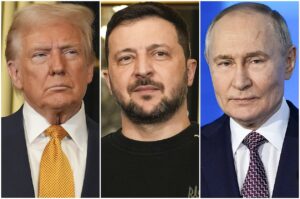
The White House is looking for a venue for a possible meeting at the end of next week, where the US, Russia, and Ukraine could discuss resolving the conflict — with Ukraine actively demanding its participation in any negotiations.
CBS News representatives confirm that the US administration is looking for a venue for a meeting between Presidents Trump, Putin, and Zelensky, which could take place as early as next week.
The summit between Trump and Putin is scheduled for August 15 in Anchorage, Alaska, which the US administration is calling a fact-finding meeting, with no clear promises to end the conflict.
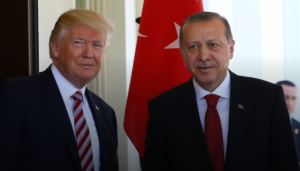
Turkish President Recep Tayyip Erdogan has said that US President Donald Trump has expressed his readiness to come to Turkey to work on peace with Ukraine if Putin comes, TRT Global reports.
“The Turkish president revealed details of his conversation with US leader Donald Trump, saying that he is ready to come to participate in peace talks. “If Russian President Vladimir Putin comes to Istanbul or Ankara for a settlement, I will also come to Istanbul or Ankara,” Erdogan quoted Trump as saying to reporters on board the plane after returning from the Netherlands.
The Turkish leader emphasized his country’s readiness to take decisive steps for a peaceful settlement: “If we need to dig a well with a needle to find a solution, we will do it.”
Erdogan spoke about his meeting with Ukrainian President Volodymyr Zelenskyy at a dinner with the King of the Netherlands on June 24, where the support of Ukraine’s allies and the outcome of the war were the main topics of discussion.